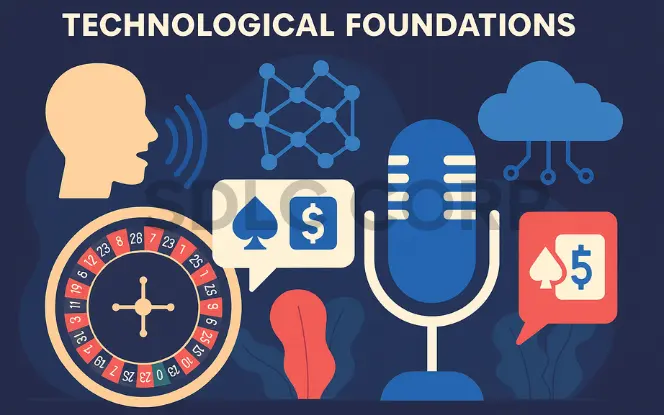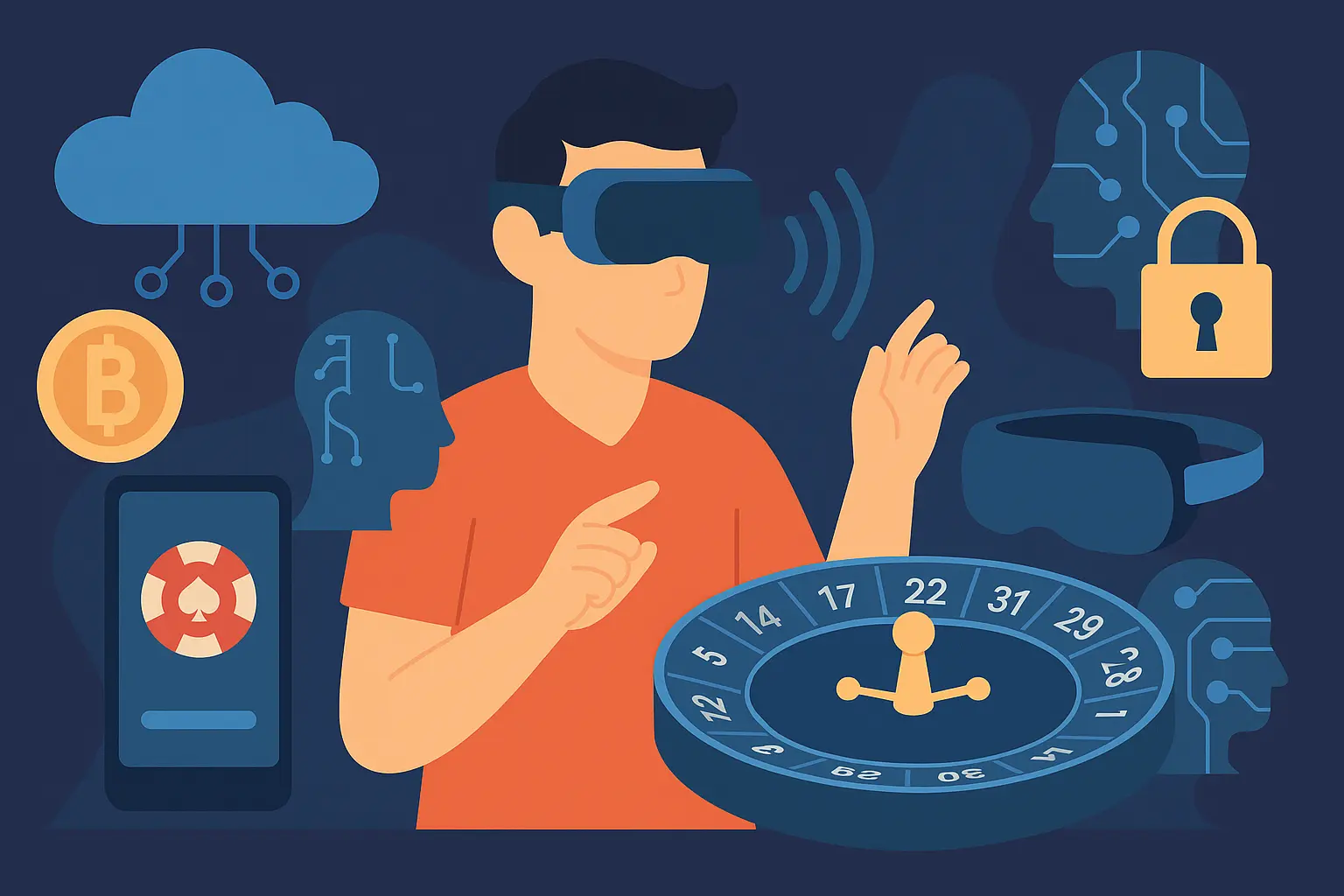Introduction: The Rise of Smart Gambling
Artificial Intelligence (AI) is rapidly reshaping the casino and iGaming industry. As players increasingly seek engaging and customized experiences, traditional game mechanics are being replaced by real-time personalization powered by AI. This includes tailored gameplay, bonus systems, emotion-aware interactions, and adaptive difficulty levels.
Smart casinos now use AI to enhance player retention, engagement, and satisfaction. This blog explores the evolution of AI in gambling, from its challenges and strategic alignment to its implementation, use cases, and benefits.
Launch Your Casino Game Today!

The Evolution Toward Voice-Controlled Gaming
Benefits of Voice-Controlled Casino Gaming
- Classic to Digital to Voice: From mechanical slot machines and video slots to today’s live dealer and VR interfaces, casino tech has consistently embraced innovation. Voice control is the latest milestone in this trajectory
- Voice Assistants Go Gaming: AI assistants—from Siri to Google Assistant—have matured into gaming-compatible agents. They now support in-game commands like switching games, placing bets, or requesting payout stats
- Emerging Infrastructure: Faster networks (such as 5G) and improved NLP systems ensure voice commands are executed with near-zero latency—critical in fast-paced games like live poker or roulette
a. Accessibility and Inclusivity
Voice control democratizes casino access—especially for players with mobility or vision impairments. Commands like “spin slots,” “hit,” or “raise by 10” provide smooth gameplay without reliance on fine motor skills or screen navigation Language support and adjustable speech profiles further extend accessibility—catering to diverse linguistic and demographic groupsb. Enhanced Convenience and Immersion
Commanding the interface by voice feels more natural and fluid than tapping fragmented menus. It encourages spontaneity—players can shift games, change wagers, or chat with live dealers on the fly, creating a heightened immersive experience.c. Personalized, Effortless Interaction
Voice systems now adapt to a user’s style over time. Betrolla’s platform, for example, learns speech patterns and anticipates suggestions—resulting in a play experience that evolves with the player Integrating emotion-sensing voice AI enables gameplay adjustments—like offering encouragement or pausing after frustration is detected. This deepens personalization and engagement.Technological Foundations

a. Natural Language Processing (NLP) & Voice Recognition
Modern NLP is adept at handling betting jargon—“bet,” “spin,” “split,” “deal”—in multiple languages and accents with high accuracy, often exceeding 85–90% recognition rates
Voice commands are interpreted in real time and mapped to game functions—e.g. voice-to-action pipelines map “raise $20” directly into the backend game logic.
b. Sentiment & Emotion Detection
Advanced systems analyze voice tone, speech pace, and hesitation to infer emotional states—frustration, excitement, confusion—and adapt visuals, difficulty, or bonus offers accordingly.
When integrated with AI, games can offer mini-break nudges or reward bursts to maintain flow and enjoyment.
c. AI Voicebots and Virtual Assistants
AI voicebots like QCall.ai, Yellow.ai, and Smartico offer both gameplay voice control and round‑the‑clock customer support. These voice agents handle account issues, explain game rules, and even detect player distress—escalating proactively when a risk emerges
With emotional intelligence and multilingual capability, these voicebots reduce support costs 30–40%, while responding to up to 87% of queries without human intervention
Use Cases: Spotlight on Voice-Controlled Games
Voice-Controlled Slots
Imagine saying:
- “Spin it”
- “Bet max”
- “How much do I stand to win?”
Temporary visual overlays confirm recognition while reels spin. Many voice-enabled slots today reach 89% recognition in live use across languages As voice AI gets smarter, personalization will fine-tune game visuals, RTP settings, and bonus triggers based on tone and performance.
Voice Blackjack & Table Games
In live blackjack or baccarat:
Players say “Hit,” “Stand,” “Split,” or “Double.”
Voice AI listens and relays the command seamlessly.
Emotion detection enables adaptive suggestion prompts when confusion or frustration rises.
These features transform table games from manual interfaces into conversational, intuitive experiences.
Live Dealer Interaction
With voice control, players can:
Talk to human dealers—ask questions, claim side bets, or chat.
Use voice commands to tip, switch cameras, adjust sound.
This creates a hybrid experience—part human, part AI—ideal for VR and high-immersive platforms
Voice-First Mobile & Chat Platforms
Platforms like Telegram-based casinos already integrate voice betting—e.g., “Bet 50 on red,” followed by “show my history”—all by voice, without leaving the chat interface. This voice-first modal is rapidly expanding in mobile-first markets.
Voice‑Enabled Customer Support & Responsible Gaming
Voice bots can initiate safety checks:
Remind users to take a break after long sessions.
Provide feedback if a player exhibits risk patterns.
Guide them to self-exclusion or help support services when needed.
These proactive interventions foster responsible gaming while being integrated directly into the voice flow
Strategic Challenges & Considerations

a. Privacy, Data & Emotional Consent
Voice capture is inherently sensitive—voice tones convey emotional and biometric signals. Consent must be explicit, data must be encrypted in transit and at rest, and voice processing should be anonymous or pseudonymized. Compliance with GDPR, CCPA, and gambling-specific regulations is mandatory.
b. Emotional AI Accuracy & Misinterpretation
Incorrect sentiment detection can lead to misfires—such as awarding bonuses to frustrated users or failing to pause after signs of distress. Models must be rigorously validated across demographics and psychological profiles to minimize bias and error.
c. Ethical Gaming vs. Manipulation
Voice systems can give the illusion of human intimacy. But they must avoid influencing impulsive or high-risk behavior. Operators must embed guardrails—like opt-outs, fatigue detection, stake limits—to prevent over-personalization from crossing ethical lines.
d. Technical Integration Complexity
Voice systems must integrate with RNG engines, live tables, payout systems, AI personalization engines, and multi-platform architectures—all while preserving uptime and security.
e. Real-Time Responsiveness
Voice command recognition, semantic parsing, and execution must happen with imperceptible delay—even in noisy environments. Infrastructure must be optimized with edge computation and robust error handling.
The Future Landscape: Toward Voice-First Casinos of 2030–2050
- Deep personalization: Voice AI will remember player preferences—game type, ambience, theme, speed—and automatically cater to them.
Voice-generated content: Future engines may craft mid-game narratives or themed experiences on the fly based on player input and history
Fully automated casinos: Imagine walking into a brick‑and‑mortar casino where centurion‑style holographic assistants take voice commands—no human staff needed
- Multimodal interaction: Combining gesture, voice, eye tracking, and AR for seamless immersive environments.
- voice-led responsible play: Continuous feedback loops where voice systems pause play, offer help, or encourage breaks when risk spikes

Integration with Emerging Technologies: Expanding the Voice-Driven Ecosystem
Voice-controlled casino games are not evolving in isolation—they’re converging with cutting-edge technologies like augmented and virtual reality (AR/VR), blockchain, biometrics, and cloud AI to create deeply immersive, intelligent, and secure ecosystems. These integrations will define the next generation of gaming experiences.
a. Voice + Augmented Reality (AR)
AR overlays paired with voice commands can turn physical environments into interactive casino floors. Picture smart glasses projecting a 3D roulette wheel onto your kitchen table. You simply say, “Bet on black,” and the wheel spins. These hybrid environments offer tactile presence with hands-free control.
b. Voice in Virtual Reality (VR) Casinos
VR casinos already simulate real-world environments—but adding voice takes them to the next level. In these immersive spaces, players can:
Converse naturally with AI-powered dealers,
Switch games or tables by command,
Place bets or claim rewards—all through voice.
This unlocks fully interactive VR gambling, blending realism with convenience.
c. Blockchain Integration
In crypto casinos, voice could control blockchain-based transactions. For example:
“Withdraw 0.01 BTC,”
“Claim NFT bonus,”
“View smart contract history.”
Using voice with blockchain adds transparency, automation, and secure, immutable records to voice-enabled interactions.
d. Biometric Voice Authentication
Voiceprints can be used as unique biometric IDs. This allows:
Secure logins via voice recognition,
Personalized account access,
Fraud prevention by verifying player identity.
Voice biometrics reduce friction while enhancing account security and personalization.
e. Cross-Device Voice Continuity
Imagine starting a session on your smart speaker, continuing on your smartwatch, and finishing on a VR headset. Voice-enabled cloud memory makes this possible—synchronizing preferences, session data, and commands across all platforms. This leads to a truly seamless multi-device gambling experience.

Conclusion: AI is the Game-Changer
AI is not just an emerging tech—it’s a current linchpin in casino innovation. With real-time personalization, improved safety nets, enhanced operational efficiency, and fraud detection, AI offers a strategic advantage.
But success requires a multi-pronged approach: ethical design, governance, cross-functional expertise, and continuous iteration. Operators who deploy AI responsibly are poised to thrive; those who ignore these elements risk regulatory backlash, player mistrust, and failure to capitalize on AI’s full potential.
As technology continues to evolve, so too will the expectations of digital players. Casinos that embrace this intelligent transformation early will set the standards for innovation, fairness, and sustainable success in the gaming industry.
FAQ
What are voice-controlled casino games?
Voice-controlled casino games allow players to interact using voice commands instead of traditional buttons or touchscreens. Players can say things like “Spin the wheel,” “Bet $10 on red,” or “Double down,” and the system responds in real-time.
How do voice commands work in casino games?
These games use Natural Language Processing (NLP) and voice recognition to convert speech into game actions. Advanced AI maps spoken commands to specific in-game functions like betting, spinning, or chatting with live dealers.
Are voice-controlled games safe and secure?
Yes—if designed correctly. Reputable platforms use encrypted voice data, require user consent, and follow GDPR or CCPA regulations. However, players should review privacy policies before enabling voice features.
Can I play voice-controlled casino games on mobile?
Absolutely! Many voice-enabled games are optimized for mobile and tablets. Some also work via voice assistants like Google Assistant or Siri, offering a seamless experience on the go.
What if the system misinterprets my voice command?
Most platforms confirm your action visually or audibly before executing it. You can usually cancel or correct commands, and newer systems have built-in learning models to improve recognition over time.



